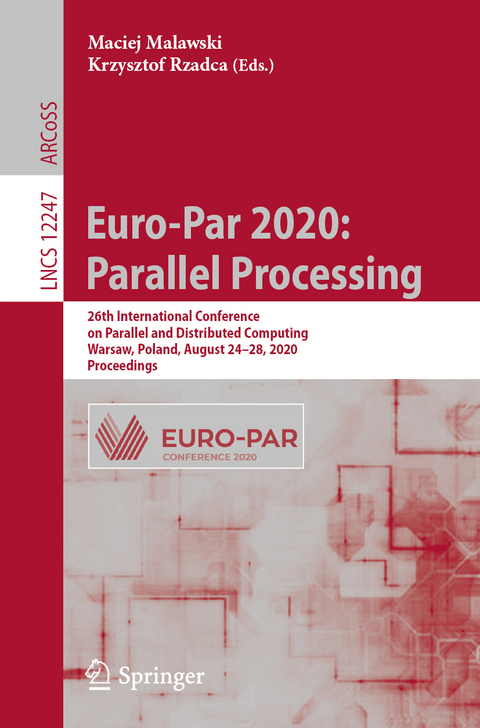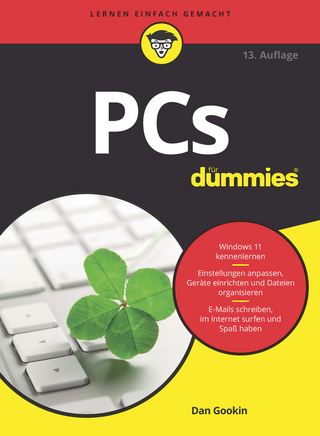
Euro-Par 2020: Parallel Processing
Springer International Publishing (Verlag)
978-3-030-57674-5 (ISBN)
This book constitutes the proceedings of the 26th International Conference on Parallel and Distributed Computing, Euro-Par 2020, held in Warsaw, Poland, in August 2020. The conference was held virtually due to the coronavirus pandemic.
The 39 full papers presented in this volume were carefully reviewed and selected from 158 submissions. They deal with parallel and distributed computing in general, focusing on support tools and environments; performance and power modeling, prediction and evaluation; scheduling and load balancing; high performance architectures and compilers; data management, analytics and machine learning; cluster, cloud and edge computing; theory and algorithms for parallel and distributed processing; parallel and distributed programming, interfaces, and languages; multicore and manycore parallelism; parallel numerical methods and applications; and accelerator computing.
Support Tools and Environments.- Skipping Non-essential Instructions Makes Data-dependence Profiling Faster.- A Toolchain to Verify the Parallelization of OmpSs-2 Applications.- Performance and Power Modeling, Prediction and Evaluation.- Towards a Model to Estimate the Reliability of Large-scale Hybrid Supercomputers.- A Learning-Based Approach for Evaluating the Capacity of Data Processing Pipelines.- Operation-Aware Power Capping.- A Comparison of the Scalability of OpenMP Implementations.- Evaluating the Effectiveness of a Vector-Length-Agnostic Instruction Set.- Scheduling and Load Balancing.- Parallel Scheduling of Data-Intensive Tasks.- A Makespan Lower Bound for the Scheduling of the Tiled Cholesky Factorization Based on ALAP Scheduling.- Optimal GPU-CPU Offloading Strategies for Deep Neural Network Training.- Improving mapping for sparse direct solvers: A trade-off between data locality and load balancing.- High Performance Architectures and Compilers.- Modelling Standard and Randomized Slimmed Folded Clos Networks.- OmpMemOpti: Optimized Memory Movement for Heterogeneous Computing.- Data Management, Analytics and Machine Learning.- Accelerating Deep Learning Inference with Cross-Layer Data Reuse on GPUs.- Distributed Fine-Grained Traffic Speed Prediction for Large-Scale Transportation Networks based on Automatic LSTM Customization and Sharing.- Optimizing FFT-based convolution on ARMv8 multi-core CPUs.- Maximizing I/O Bandwidth for Reverse Time Migration on Heterogeneous Large-Scale Systems.- Cluster, Cloud and Edge Computing.- TorqueDB: Distributed Querying of Time-series Data from Edge-local Storage.- Data-Centric Distributed Computing on Networks Mobile Devices.- WPSP: a multi-correlated weighted policy for VM selection and migration for Cloud computing.- Theory and Algorithms for Parallel and Distributed Processing.- LCP-Aware Parallel String Sorting.- Mobile RAM and Shape Formation by Programmable Particles.- Approximation Algorithm for Estimating Distances in Distributed Virtual Environments.- On the Power of Randomization in Distributed Algorithms in Dynamic Networks with Adaptive Adversaries.- 3D Coded SUMMA: Communication-Efficient and Robust Parallel Matrix Multiplication.- Parallel and Distributed Programming, Interfaces, and Languages.- Managing Failures in task-based parallel workflows in distributed computing environments.- Accelerating Nested Data Parallelism: Preserving Regularity.- Using Dynamic Broadcasts to improve Task-Based Runtime Performances.- A Compression-Based Design for Higher Throughput in a Lock-Free Hash Map.- Multicore and Manycore Parallelism.- NVPhTM: An Efficient Phase-Based Transactional System for Non-Volatile Memory.- Enhancing Resource Management through Prediction-based Policies.- Accelerating Overlapping Community Detection: Performance Tuning a Stochastic Gradient Markov Chain Monte Carlo Algorithm.- Parallel Numerical Methods andApplications.- A Prediction Framework for Fast Sparse Triangular Solves.- Multiprecision block-Jacobi for Iterative Triangular Solves.- Efficient Ephemeris Models for Spacecraft Trajectory Simulations on GPUs.- Parallel Finite Cell Method with Adaptive Geometric Multigrid.- Accelerator Computing.- cuDTW++: Ultra-Fast Dynamic Time Warping on CUDA-enabled GPUs.- Heterogeneous CPU+iGPU Processing for Efficient Epistasis Detection.- SYCL-Bench: A Versatile Single-Source Benchmark Suite for Heterogeneous Computing.
| Erscheinungsdatum | 18.08.2020 |
|---|---|
| Reihe/Serie | Lecture Notes in Computer Science | Theoretical Computer Science and General Issues |
| Zusatzinfo | XLIII, 646 p. 492 illus., 192 illus. in color. |
| Verlagsort | Cham |
| Sprache | englisch |
| Maße | 155 x 235 mm |
| Gewicht | 1044 g |
| Themenwelt | Mathematik / Informatik ► Informatik ► Betriebssysteme / Server |
| Mathematik / Informatik ► Informatik ► Software Entwicklung | |
| Mathematik / Informatik ► Informatik ► Theorie / Studium | |
| Informatik ► Weitere Themen ► Hardware | |
| Schlagworte | Applications • Artificial Intelligence • Cloud Computing • Computer Networks • Computer Science • Computer systems • conference proceedings • distributed computer systems • Embedded Systems • GPU • High-Performance Computing • HPC • Informatics • Internet • Microprocessor chips • multi core • Network Protocols • Parallel Algorithms • Parallel Architectures • parallel processing systems • Parallel Programming • Processors • Research • Signal Processing • Telecommunication Systems |
| ISBN-10 | 3-030-57674-4 / 3030576744 |
| ISBN-13 | 978-3-030-57674-5 / 9783030576745 |
| Zustand | Neuware |
| Haben Sie eine Frage zum Produkt? |
aus dem Bereich


